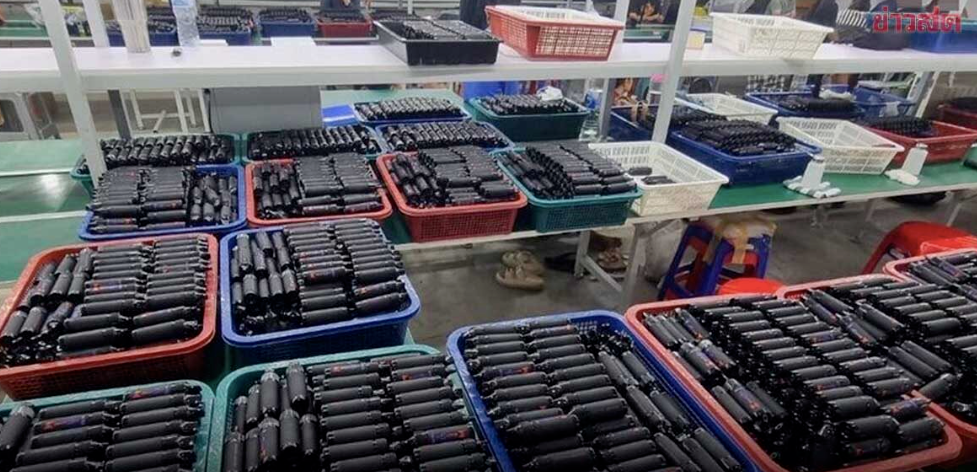Thai Police Uncover Massive Illegal Vape Factory: Chinese Supervisor Arrested in Pathum Thani Raid
In a decisive strike against Thailand’s shadow vape economy, police stormed a clandestine e-cigarette manufacturing hub in Pathum Thani province last week, arresting 29 workers – including a Chinese technical supervisor – and seizing over 21,000 illicit devices. The operation exposes the industrial-scale sophistication of black-market vapor production exploiting Thailand’s strict prohibition laws, with authorities confiscating equipment and fruit flavored vape products valued at 6.1 million THB ($189,000).
Inside the Raid: Anatomy of a Covert Vape Operation
On June 28, 2025, tactical units surrounded a three-story commercial building in Lam Luk Ka district following weeks of surveillance. Behind its ordinary facade lay a sprawling 4,800–6,400m² facility housing:
- Assembly lines for disposable and refillable e-cigarette devices
- Six industrial press machines for hardware production
- E-liquid mixing stations with flavor concentrates for fruit flavored vape lines
- Sealing machines and automated filling equipment
- Finished product storage with 21,200 ready-to-ship units
The arrested included 52-year-old Chinese national Lu Jinke (alleged production supervisor), 7 Thais, 2 Vietnamese, and 19 Cambodian workers. Investigators confirmed the factory began operations in early 2025, initially producing disposable vape pens before pivoting to reusable models to meet consumer demand for customizable fruit flavored vape options.
Thailand’s Vape Ban: Fueling a Black Market
Thailand enforces among the world’s strictest e-cigarette prohibitions:
- ⚖️ 10-year prison sentences for sales/import
- ⚖️ 5-year terms for possession
- ❌ Complete ban on advertising
These laws stem from concerns about youth adoption and unregulated substances. Earlier in 2025, Pattaya police busted a Chinese-led operation spiking fruit flavored vape liquids with etomidate – an anesthetic causing dependency – sold to teenagers. Despite penalties, demand persists:
- Thailand has ~800,000 regular vapor users
- Illegal disposables sell for 130 THB (~$4) vs. $15–$20 in legal markets
- 70% of seized products feature fruit/dessert flavors
The Illegal Vape Supply Chain: Tactics & Regional Ties
The factory’s multinational workforce reflects Southeast Asia’s illicit e-cigarette network:
- Component Sourcing
Batteries and atomizers smuggled from China/Vietnam; flavor concentrates imported as “food additives” - Stealth Manufacturing
Rented industrial spaces (this facility paid 150,000 THB/month) in low-surveillance zones - Distribution
Online sales via Telegram/Instagram; retail through convenience stores and night markets - Regional Smuggling
Devices trafficked to Cambodia/Laos (similar bans) and Malaysia (high taxes)
Notably, workers were installing conveyor belts during the raid – signaling plans to boost daily output from 3,000 to 8,000 units. This mirrors a Bangkok operation dismantled days earlier, where Chinese technicians directed Myanmar migrants to refurbish used vape devices.
Unregulated products pose documented dangers:
- 📌 Toxic Additives: Diacetyl in counterfeit fruit flavored vape liquids linked to “popcorn lung”
- 📌 Nicotine Irregularities: Devices tested at 2–5x labeled concentrations
- 📌 Hardware Hazards: Faulty batteries causing burns/explosions (37 incidents reported in Thailand, 2024)
The Pathum Thani factory’s lack of quality controls exemplifies these risks. Health Ministry testing of similar illegal e-cigarette seizures found:
- 12% contained vitamin E acetate (linked to EVALI lung disease)
- 28% had bacterial/fungal contamination
- 63% exceeded EU nicotine limits
Economic Impact: Market Distortion & Enforcement Costs
Thailand’s ban creates severe economic ripple effects:
- 💰 Tax Losses: Estimated $86M/year in uncollected excise taxes
- 🛑 Legitimate Business Suppression: Local shops face 10-year sentences for selling alternatives to cigarettes
- 📈 Enforcement Burden: 2,400+ vape-related arrests in 2024 alone
Police confirm the raided factory generated ~200,000 THB/day revenue, highlighting the profitability driving illegal operations.
Regulatory Crossroads: Will Thailand Reconsider Its Vape Ban?
This raid intensifies debate about prohibition efficacy:
- Prohibition Argument:
Health Ministry cites youth protection; notes 24% of Thai teens tried vapor products despite bans - Legalization Advocacy:
Tobacco harm reduction groups propose:
• Regulated adult-only sales
• Ingredient transparency for e-cigarette liquids
• Flavor restrictions (excluding tobacco/menthol)
• 30% excise taxes funding youth prevention
Neighboring Philippines’ recent regulated vape framework reduced illicit market share from 64% to 31% within 18 months – a potential model.
Global Implications for the Vape Industry
The Pathum Thani case offers critical lessons:
- Supply Chain Vigilance
Legitimate vapor brands must audit suppliers to prevent diversion to black markets - Consumer Education
Highlighting dangers of unregulated fruit flavored vape products builds trust in legal channels - Regulatory Engagement
Advocating science-based policies counters blanket bans that fuel criminal enterprises
Conclusion: A Turning Point in Thailand’s Vape War
The dismantling of this Pathum Thani factory signals Thailand’s escalated enforcement against illegal e-cigarette networks. Yet with 29 arrests barely denting demand, the raid underscores a harsh reality: prohibition creates vacuum filled by organized crime.
As police pursue the factory’s financiers and distributors, public health and industry stakeholders watch closely. Will Thailand maintain its hardline stance, or might the scale of this illicit operation – with its automated lines and fruit flavored vape production – finally prompt pragmatic reform? For now, one truth remains evident: where regulated vapor products are absent, criminal enterprise thrives.
Discover more from Ameca-mall
Subscribe to get the latest posts sent to your email.

